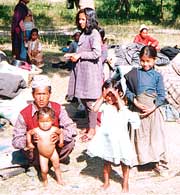 One morning earlier this month, businessmen in Surkhet were all heading out of town towards Baddichaur. They were trying to beat the Maoist deadline to register with them and fill out tax forms.
One morning earlier this month, businessmen in Surkhet were all heading out of town towards Baddichaur. They were trying to beat the Maoist deadline to register with them and fill out tax forms.
In Home Minister Purna Bahadur Khadka's hometown traders now pay two taxes: one to the government and the other to the Maoists. Thirty km outside town in Baddichaur (which the rebels have renamed 'Himal Municipality') is the Maoist contact office for surkhet businessmen to pay their revolutionary tax, for people who need Maoist 'visas' to travel to Jumla, Kalikot, Achham and Dailekh. Those travelling without visas have to face interrogations and are sent to labour camps to dig tunnels.
When the rebels began registering businesses in the district on 17 September, businessmen gathered at Baddichaur. The rebels had issued a notice saying no one was allowed to run a business without registering with the 'new regime'. As a result, 1,100 businessmen in Surkhet have registered, whereas only 300 businesses have been registered with the Surkhet Association of Industry and Commerce.
Tax collection is more efficient than the government's revenue department. It is amazing what the fear of the gun can do.
Businessmen are supposed to pay their Maoist tax by the fifth of every Nepali month. There is a flat rate of Rs 100 a month for every business with a monthly turnover of Rs 100,000. The local deputy chief of the rebels says Surkhet businessmen are paying anywhere between Rs 25-Rs 5,000 a month.
For Maoist land registration, people are supposed to go further up the road to Babiyachour. The Maoists also have their own vehicle registration done in Ramghat and Mehalkuna in Surkhet.
CDO Tilakram Sharma admits he knows about the Maoist taxes, but his administration can do little to stop it. Chairman of the Surkhet Association of Industry and Commerce Tek Bahadur Bhandari says no one dares to defy the Maoist order to register. "Everyone has been to Baddichaur, and there is nothing the administration can do to stop it," he says.
The Maoists don't allow people from Surkhet, Dailekh and Accham to take provisions and goods up to their areas unless it has been bought in a registered shop, and this is an added reason why everyone has registered.
The villagers know the Maoist rule and they make sure that they buy things only from shops and business houses that have registered with them, it makes it necessary for us to register with the Maoists.
Bus operators face the same problem. The chairman of the Association of Bus Operators in the district is Home Minister Purna Bahadur Khadka's brother, and even he would not be able to ply his buses without paying off the Maoists. However, when asked he did not wish to comment.
Local businessmen seem happy with the Maoist efficiency. They have also been fed up of extortion from people pretending to be Maoists, and this way they are safe. "Now we just pay once a month, we don't get harassed by pretend Maoists," says Bhandari.
All this used to happen in Maoist base areas. With the registration in Surkhet, the Maoists seem to be testing their reach in government areas as well. After King Gyanendra's recent visit, all government offices are being shifted from Nepalganj to Surkhet, and this is the Maoists' way of thumbing their noses at the state.
--------------------------------------------------------------------------------
Mourning in Dasain
While Home Minister Purna Bahadur Khadka celebrated tika at his home in Surkhet, dozens of displaced villagers from Mugu and Jumla were living in tents nearby. They had no food and were begging from house to house. "What Dasain are you talking about when we don't have shelter or food to eat?" a frail looking Chandra Buda asked. "We aren't celebrating anything." About 200 villagers from the two districts are now living in the open here and more are coming since the Maoists intensified their 'join us or leave your homes' campaign. Most victims were subsistence farmers. The Surkhet district administration says it doesn't have money to take care of them.
Minister Khadka drove to them in a line of escort cars and assured them the govenrment would fly them back to their homes in a helicopter and sped away leaving the bewildered refugees in tears.
--------------------------------------------------------------------------------  Ambushed child
Ambushed child
Nanda Buda, one-year-old, toddled on the bloody floor to wake her mother Bidra. She was hungry. But her mother was dead, killed by a Maoist booby trap in their village in Mugu. Bidra was killed instantly while her daughter survived. Her husband Jay Chandra recounts finding his wife and how he collapsed on seeing her dead. The Maoists tried to take Nanda but Jay Chandra woke up and stopped them. "We are not going with you. I have lost my wife and don't want to lose my daughter too," Jay Chandra recalls telling them. The rebels forced him to leave the village. Today, he and his three young daughters are living in Surkhet with hundreds of other refugees from Humla. "So many reporters have come and I have told them my story, but no one has helped," says Jay Chandra.


